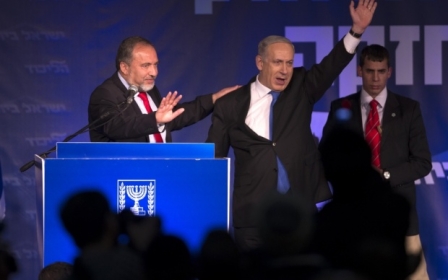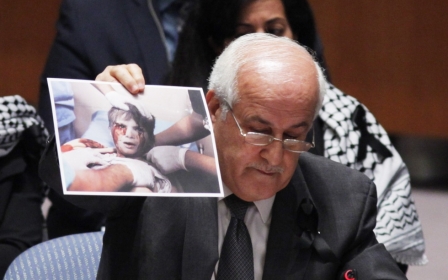Abbas applies for ICC membership after UN defeat
Abbas met Wednesday top officials to discuss way forward after abortive overnight vote at the Security Council

Palestinian President Mahmoud Abbas on 23 December (AA)
Published date: 13 February 2015 08:00 GMT
|
Last update: 9 years 9 months ago
Palestinian president Mahmud Abbas signed the Treaty of Rome as a first step to joining the International Criminal Court, after the UN Security Council rejected a resolution on ending the Israeli occupation.
The signed statute will be submitted to Ban Ki Moon, the UN Secretary General, but his consideration of the application to join the ICC will be a formality.
The move allows Palestinians to sue Israeli military and government officials for war crimes in the occupied territorities, not just from the day the statute is signed, but retrospectively too. The Palestinian leader also signed about 20 other international conventions, sources said.
Chief negotiator Saeb Erakat said that the applications to join these organisations would go into effect in the next 90 days. He vowed that the Palestinians would return to the United Nations Security Council and stated that until then, the Palestinian leadership would meet to advance other plans for Palestinian statehood recognition in international bodies, such as the ICC.
"There will be no more waiting, no more hesitation, no more slowdown," Erekat said. "We are going to meet and make decisions."
Before the meeting, Fatah spokesman Ahmed Assaf told Palestinain TV that: “The coming hours will witness a raft of fateful decisions taken by the Palestinian leadership.”
Based in The Hague, the ICC can prosecute individuals accused of genocide, crimes against humanity and war crimes, committed since 1 July 2002, when the Rome Statute came into force.
The court can only pursue an individual if crimes were committed on the territory of a state party - one that signed and ratified the Rome Statute - or by a citizen of such a state.
Since Israel launched its military assault in early July, both Hamas and Israeli officials have accused the other of committing war crimes. If Palestine were to join the ICC, its various factions would become liable for possible prosecution.
Despite the potential for Hamas to be subject to prosecution should Palestine join the ICC, the group has been pressuring Abbas to push the process forward, MEE reported exclusively in August.
However, Hamas on Wednesday denounced Palestinian president Mahmoud Abbas for the "failure" to push through a UN resolution: "This was a unilateral decision taken by Abu Mazen [Abbas] who has taken the Palestinian decision-making process hostage," Hamas spokesman Fawzi Barhum told AFP, describing it as a "new failure" by the Palestinian leader.
The Palestinians in 2009 asked the ICC's prosecutor's office to investigate alleged war crimes and crimes against humanity committed by the Israeli military in Gaza. Israel has signed but not ratified the treaty, making the prospect of investigating crimes on territory it controlled extremely difficult.
However, there has so far been no probe as Palestine is not an ICC member state and its status as a state is uncertain in some international institutions.
According to the ICC's official website, last updated in May 2013, the Rome Treaty has been ratified by 122 states.
Security Council defeat
Tuesday's vote defeat came after a campaign by the Palestinians at the United Nations to win support for the resolution that would have set a timeframe for ending the Israeli occupation.
Council heavyweights China, France and Russia were among eight countries voting in favour, while the United States and Australia voted against. Five others abstained, among them Britain, but also Nigeria which had been expected to support the resolution.
A Palestinian source involved in the negotiations told the Guardian: “Even half an hour before the vote, Nigeria indicated it was committed to voting for the resolution. We knew that Rwanda, South Korea and Australia would not back it, but we believed Nigeria was on board.”
The apparent change by Nigeria, which is a rotating member of the council, came after both the Israeli Prime Minister, Benjamin Netanyahu, and the US secretary of state, John Kerry, phoned the Nigerian President, Goodluck Jonathan, to ask him not to support the resolution.
A State Department spokesman said on Tuesday that Kerry had called a number of senior foreign officials, including Jonathan, before the vote to try and convince them to vote no.
At the same time, Netanyahu confirmed Wednesday that he had spoken to both President Paul Kagame of Rwanda and Jonathan before the UN vote. “I spoke with both of them,” he told reporters. “They promised me personally that they would not support this decision and they stood by their words. That is what tipped the scales.”
Netanyahu allegedly had a private meeting with the Nigerian president – seen by Israel as a potential ally on the security council – during the latter’s pilgrimage to Jerusalem in October, reported the Guardian.
According to various analysts and commentators, the Palestinians had hoped to secure nine votes, needed to pass the resolution, and to push the US to use its veto power if they could not secure a yes vote or an abstention.
Frustrated by the moribund peace process, the Palestinian leadership in the West Bank has pursued a more confrontational approach toward Israel and the US by seeking broader international recognition for a Palestinian state.
In 2012 the UN accepted Palestine as a non-member observer state. The Palestinians' next step was the UN bid to set a timetable for an Israeli withdrawal from the West Bank and east Jerusalem, lands seized in the 1967 Arab-Israeli war.
New MEE newsletter: Jerusalem Dispatch
Sign up to get the latest insights and analysis on Israel-Palestine, alongside Turkey Unpacked and other MEE newsletters
Middle East Eye delivers independent and unrivalled coverage and analysis of the Middle East, North Africa and beyond. To learn more about republishing this content and the associated fees, please fill out this form. More about MEE can be found here.



